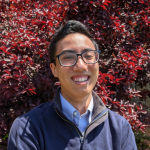Current Lab Members

Frank Guenther, Ph.D. is a Professor in the Departments of Speech, Language & Hearing Sciences and Biomedical Engineering at Boston University. He is also a Research Affiliate at the Picower Institute for Learning and Memory at MIT, a Faculty Member in the Harvard/MIT Speech and Hearing Bioscience and Technology Program, and a Visiting Scientist in the Department of Radiology at Massachusetts General Hospital. Dr. Guenther is a computational and cognitive neuroscientist specializing in speech and sensorimotor control. His research program combines theoretical modeling with behavioral and neuroimaging experiments to characterize the neural computations underlying these faculties in humans. Dr. Guenther also develops brain-computer interfaces to restore synthetic speech and other communication skills to paralyzed individuals. His research has been covered extensively in the science and popular media, including television spots on CNN News, PBS News Hour, and Fox News; articles in popular science magazines Discover, Scientific American, and Popular Science; and popular press coverage in Esquire, Wired, The Boston Globe, and BBC News.
Faculty
 Jason Tourville, Ph.D. is a Research Assistant Professor in the Department of Speech, Language & Hearing Sciences and Center for Computational Neuroscience and Neural Technology at Boston University. He received his B.A. from Oberlin College and his Ph.D. in Cognitive and Neural Systems at Boston University. He is a cognitive and computational neuroscientist primarily focused on mapping the brain regions involved in speech motor control. His research combines mathematical modeling with functional and structural brain imaging to study the neural mechanisms underlying normal and disordered speech, including persistent developmental stuttering, apraxia of speech, spasmodic dysphonia, and autism. Dr. Tourville also has an extensive background in human neuroanatomy and MRI-based brain morphometry that he uses to develop expert-guided semi-automated brain region labeling methods.
Jason Tourville, Ph.D. is a Research Assistant Professor in the Department of Speech, Language & Hearing Sciences and Center for Computational Neuroscience and Neural Technology at Boston University. He received his B.A. from Oberlin College and his Ph.D. in Cognitive and Neural Systems at Boston University. He is a cognitive and computational neuroscientist primarily focused on mapping the brain regions involved in speech motor control. His research combines mathematical modeling with functional and structural brain imaging to study the neural mechanisms underlying normal and disordered speech, including persistent developmental stuttering, apraxia of speech, spasmodic dysphonia, and autism. Dr. Tourville also has an extensive background in human neuroanatomy and MRI-based brain morphometry that he uses to develop expert-guided semi-automated brain region labeling methods.
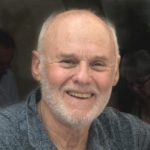
Joseph Perkell, Ph.D. is a Senior Research Scientist in the Department of Speech, Language & Hearing Sciences. He is also a Research Affiliate at the Research Laboratory of Electronics at the Massachusetts Institute of Technology. Dr. Perkell has been engaged in research on speech motor control since 1965. His former laboratory, in the Research Laboratory of Electronics at MIT, developed EMMA, the first electromagnetic articulometer system shown to have accuracy and reliability sufficient for rigorous research on speech kinematics. From the early 1990’s until 2012, Dr. Perkell headed the Speech Motor Control Group in RLE and was PI on two long-running R01 grants from NIDCD. The group published a number of carefully conducted, hypothesis-driven, methodologically sophisticated studies of speech production: on biomechanical constraints and motor control strategies, including the role of hearing. For its last 15 years, the group collaborated closely with Prof. Guenther, whose DIVA model provided the theoretical framework for research in both projects, guiding work on brain mechanisms and the influence of these mechanisms on speech kinematics and acoustics. Dr. Perkell was also a participating faculty member in the Harvard-MIT Graduate Program in Speech and Hearing Biosciences and Technology Program, for which he served on the program’s admissions committee and supervised graduate students. Dr. Perkell’s most recent review papers showed how his group’s work was consistent with a coherent theoretical framework that modeled relations among brain mechanisms, audition and speech motor control.
Research Staff
 Barbara Holland, M.A. is Assistant Director of Research in the Department of Speech, Language & Hearing Sciences at Boston University. She received her B.A. in Psychology from the University of New Hampshire and M.A. in Psychology, emphasis in Neuropsychology, from the University of Northern Colorado. Prior to joining BU, Barbara worked at the Center for Morphometric Analysis on a study of attentional network pathology in persons diagnosed with schizophrenia. Responsibilities included recruitment and neuropsychological testing of participants, conducting fMRI experiments, analysis of functional and structural data MRI, refinement of structural MRI analysis methods developed at the Center for Morphometric Analysis.
Barbara Holland, M.A. is Assistant Director of Research in the Department of Speech, Language & Hearing Sciences at Boston University. She received her B.A. in Psychology from the University of New Hampshire and M.A. in Psychology, emphasis in Neuropsychology, from the University of Northern Colorado. Prior to joining BU, Barbara worked at the Center for Morphometric Analysis on a study of attentional network pathology in persons diagnosed with schizophrenia. Responsibilities included recruitment and neuropsychological testing of participants, conducting fMRI experiments, analysis of functional and structural data MRI, refinement of structural MRI analysis methods developed at the Center for Morphometric Analysis.
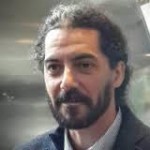 Alfonso Nieto-Castanon, Ph.D. is a Senior Research Scientist in the Department of Speech, Language & Hearing Sciences at Boston University. In his private practice he also works as a statistical consultant, analyst, and methods/software developer. In addition to providing modeling and statistical support to research groups in the field of computational neuroscience, some of his ongoing projects involve functional connectivity magnetic resonance imaging (fcMRI) analysis methods, the application of functional localizers to investigate the selectivity of language-related areas, and method development for speech restoration in subjects with locked-in syndrome.
Alfonso Nieto-Castanon, Ph.D. is a Senior Research Scientist in the Department of Speech, Language & Hearing Sciences at Boston University. In his private practice he also works as a statistical consultant, analyst, and methods/software developer. In addition to providing modeling and statistical support to research groups in the field of computational neuroscience, some of his ongoing projects involve functional connectivity magnetic resonance imaging (fcMRI) analysis methods, the application of functional localizers to investigate the selectivity of language-related areas, and method development for speech restoration in subjects with locked-in syndrome.
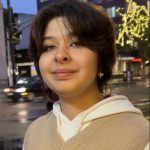
Anita Keltcher, Boston University graduate 2025. Anita has a B.A. in Neuroscience and a minor in flute performance. They are currently helping with preprocessing of audio data for further analysis. Their hobbies and interests include drawing, reading, classical music, flute, cooking, baking and Kendo which is a Japanese Martial art. Anita hopes to pursue an MD/PhD and continue neuroscience research into their professional career.
Postdocs
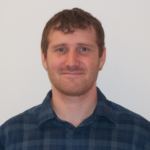 Andrew Meier, Ph.D., is a Postdoctoral Fellow in the Department of Speech, Language, and Hearing Sciences at Boston University. Andrew received his B.A. in Liberal Arts from St. John’s College, New Mexico, and his PhD in Neuroscience from Washington University in St. Louis. His research investigates neuroplasticity and learning in speech motor control. Currently he is involved in a collaboration between the Guenther Lab and Dr. Mark Richardson at Mass General Hospital, designing and analyzing speech science studies with patients undergoing surgery for deep brain stimulation. In these studies, Andrew seeks to understand the physiology of the cortical, basal ganglia, and thalamic networks that underlie the learning of new speech motor patterns. These studies have implications for understanding early speech motor learning, including the development of speech disorders, such as stuttering and apraxia of speech.
Andrew Meier, Ph.D., is a Postdoctoral Fellow in the Department of Speech, Language, and Hearing Sciences at Boston University. Andrew received his B.A. in Liberal Arts from St. John’s College, New Mexico, and his PhD in Neuroscience from Washington University in St. Louis. His research investigates neuroplasticity and learning in speech motor control. Currently he is involved in a collaboration between the Guenther Lab and Dr. Mark Richardson at Mass General Hospital, designing and analyzing speech science studies with patients undergoing surgery for deep brain stimulation. In these studies, Andrew seeks to understand the physiology of the cortical, basal ganglia, and thalamic networks that underlie the learning of new speech motor patterns. These studies have implications for understanding early speech motor learning, including the development of speech disorders, such as stuttering and apraxia of speech.
Graduate Students
Rohan Deshpande is a doctoral student in the Department of Biomedical Engineering at Boston University. He received his B.S. in Bioengineering from the University of Louisville. His research interests focus on understanding how changing stimuli impact electrophysiological responses. Currently, Rohan is investigating the effect of repetition suppression on neural activity collected with ECoG.
 Jackie S. Kim, M.S. CCC-SLP is a doctoral student in the Speech, Language, and Hearing Sciences Department at Boston University. She received her B.A. in Linguistics from the University of Southern California and her M.S. in Communication Sciences and Disorders from Columbia University. Jackie worked as a medical speech-language pathologist for three years at an acute care hospital in Los Angeles before starting her PhD program. Her research focuses on neural computations of speech motor control and neurogenic communication disorders. Currently, Jackie is examining the role of the basal ganglia in motor speech sequencing through deep brain stimulation (DBS) implantation surgery studies on people with Parkinson’s, as well as functional magnetic resonance imaging (fMRI) studies on people who stutter.
Jackie S. Kim, M.S. CCC-SLP is a doctoral student in the Speech, Language, and Hearing Sciences Department at Boston University. She received her B.A. in Linguistics from the University of Southern California and her M.S. in Communication Sciences and Disorders from Columbia University. Jackie worked as a medical speech-language pathologist for three years at an acute care hospital in Los Angeles before starting her PhD program. Her research focuses on neural computations of speech motor control and neurogenic communication disorders. Currently, Jackie is examining the role of the basal ganglia in motor speech sequencing through deep brain stimulation (DBS) implantation surgery studies on people with Parkinson’s, as well as functional magnetic resonance imaging (fMRI) studies on people who stutter.
Lakshmi Girija Dhulipati is a master’s student in Artificial Intelligence at Boston University and a research assistant in the Guenther Lab. She earned her bachelor’s degree in Computer Science and Engineering from the International Institute of Information Technology, Hyderabad, where she focused on modeling brain data in the context of recognizing speech properties. Currently, her research centers on identifying different types of stuttering using fMRI data and mitigating bias in neural networks, including models like Stable Diffusion. At the Guenther Lab, she applies machine learning and signal processing techniques to analyze brain data, contributing to a deeper understanding of the neural control of speech. Her work aligns with the broader goal of enhancing computational models such as DIVA and GODIVA to better understand and address speech disorders.
 Rosalie Gendron is a doctoral student in the Speech, Language, and Hearing Sciences Department at Boston University. She received her B.S. in Psychology from McGill University, where she investigated the neural correlates of speech motor learning and retention, as well as the role of auditory feedback in speech motor control. Her research interests include using neural computations of speech motor control to bridge the gap between theoretical models of speech and therapeutic treatments for communication disorders. Currently, Rosalie’s research focuses on developing quantitative accounts of speech motor control in individual speakers, both with and without communication disorders, using behavioral and neuroimaging measures.
Rosalie Gendron is a doctoral student in the Speech, Language, and Hearing Sciences Department at Boston University. She received her B.S. in Psychology from McGill University, where she investigated the neural correlates of speech motor learning and retention, as well as the role of auditory feedback in speech motor control. Her research interests include using neural computations of speech motor control to bridge the gap between theoretical models of speech and therapeutic treatments for communication disorders. Currently, Rosalie’s research focuses on developing quantitative accounts of speech motor control in individual speakers, both with and without communication disorders, using behavioral and neuroimaging measures.
Undergraduate Students
